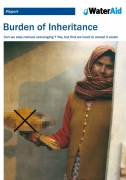 This report by WaterAid outlines how over one million people in the country continue to scrape an existence through manual scavenging, forced largely by social convention and caste prejudice, and calls for strong action to eradicate this practice.
This report by WaterAid outlines how over one million people in the country continue to scrape an existence through manual scavenging, forced largely by social convention and caste prejudice, and calls for strong action to eradicate this practice.
A violation of human rights, this discriminatory and demeaning practice was outlawed by the Indian Parliament in 1993 but still continues today. India has missed three deadlines to make the country 'manual-scavenger free'. India's booming cities help keep the practice alive, as there is often little infrastructure for sanitary sewerage and waste disposal systems.
The report tries to seek answers to why this practice continues despite:
- Availability of other dignified livelihood sources, for the people in this occupation?
- Other cleaner options for survival existing in cities and towns?
- Feasible and viable technological alternatives being available to dry toilets, one of the drivers of this occupation?
It uncovers a complex socio-economic web that has trapped the community into this practice. It finds convincingly that attitude change along with serious efforts to encourage and make available alternative employment opportunities for the manual scavengers would bring positive changes. The technological aspect of disposal of human waste has to be addressed as most of India’s booming towns and cities don not have proper sewage lines and disposal systems that contributes to continuance of manual scavenging. It lists many initiatives that have helped stop manual scavenging, followed by successful rehabilitation plans. To conclude, the report adopts a charter of change and sets the roadmap for a manual scavenging-free India.
Download the full report here from WaterAid's website.